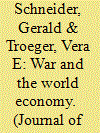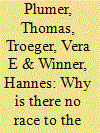| Srl | Item |
| 1 |
ID:
073759


|
|
|
|
|
| Publication |
2006.
|
| Summary/Abstract |
One of the perennial questions in the scientific study of war is how war affects the economy. The authors examine the influence that the political developments within three war regions had on global financial markets (CAC, Dow Jones, FTSE) from 1990 to 2000. They embed a rational expectation framework within commercial liberalism, a theoretical strand that tries to assess the interrelationship between war and economic exchanges. Time-series analyses account for the effects that the conflict between Israel and the Palestinians, the first confrontation of a U.S.-led alliance against Iraq, and the wars fought in Ex-Yugoslavia exerted. Using daily stock market data, the authors show that the conflicts affected the interactions at the core financial markets in the Western world negatively, if they had any systematic influence at all. They argue that these results lend some support to the rational expectations version of commercial liberalism.
|
|
|
|
|
|
|
|
|
|
|
|
|
|
|
|
| 2 |
ID:
091031


|
|
|
|
|
| Publication |
2009.
|
| Summary/Abstract |
This article explains the absence of a race to the bottom in capital taxation by analyzing fiscal competition under budget rigidities and tax equity constraints (fairness norms). We outline a political economic model of tax competition that treats the outcome of tax competition as one argument in the governments utility function, the others being public expenditure and tax equity. In accordance with previous theoretical research, tax competition tends to cause a reduction in taxes on mobile capital and an increase in the tax rates on relatively immobile labor in our model. Yet, our model predicts that governments do not fully abolish taxes on mobile capital. Instead, the government being least restricted by budget constraints and equity norms cuts tax rates to levels slightly below the lowest tax rates of those countries, in which governments are more constrained, where effective constraints are country size, budget rigidities and fairness norms. Analyzing data from 23 Organization for Economic Co-operation and Development countries between 1975 and 2004 we find empirical support for the hypotheses derived from our theoretical model.
|
|
|
|
|
|
|
|
|
|
|
|
|
|
|
|